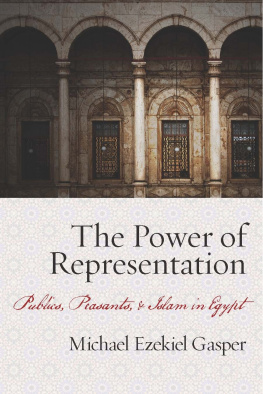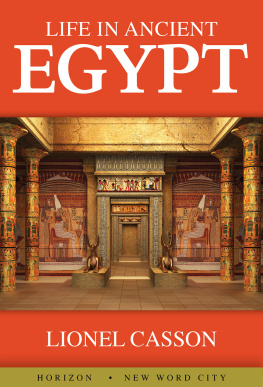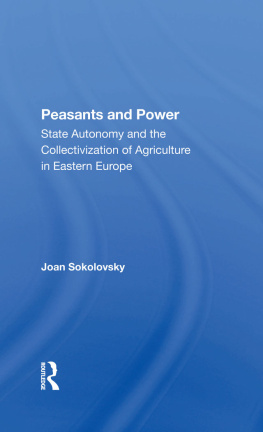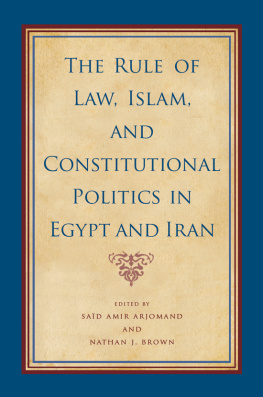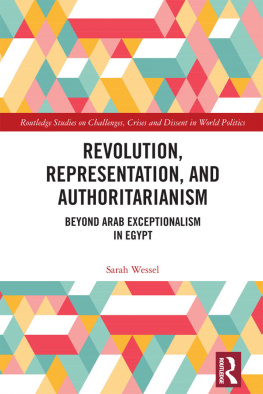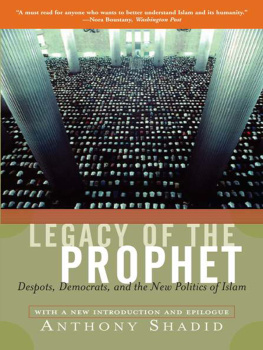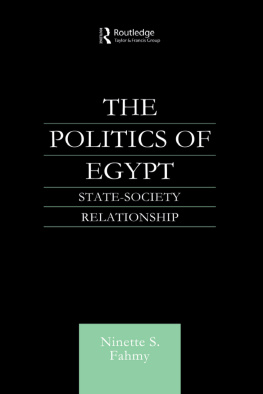Gasper - The power of representation publics, peasants, and Islam in Egypt
Here you can read online Gasper - The power of representation publics, peasants, and Islam in Egypt full text of the book (entire story) in english for free. Download pdf and epub, get meaning, cover and reviews about this ebook. year: 2011, publisher: Stanford University Press, genre: Home and family. Description of the work, (preface) as well as reviews are available. Best literature library LitArk.com created for fans of good reading and offers a wide selection of genres:
Romance novel
Science fiction
Adventure
Detective
Science
History
Home and family
Prose
Art
Politics
Computer
Non-fiction
Religion
Business
Children
Humor
Choose a favorite category and find really read worthwhile books. Enjoy immersion in the world of imagination, feel the emotions of the characters or learn something new for yourself, make an fascinating discovery.
- Book:The power of representation publics, peasants, and Islam in Egypt
- Author:
- Publisher:Stanford University Press
- Genre:
- Year:2011
- Rating:4 / 5
- Favourites:Add to favourites
- Your mark:
- 80
- 1
- 2
- 3
- 4
- 5
The power of representation publics, peasants, and Islam in Egypt: summary, description and annotation
We offer to read an annotation, description, summary or preface (depends on what the author of the book "The power of representation publics, peasants, and Islam in Egypt" wrote himself). If you haven't found the necessary information about the book — write in the comments, we will try to find it.
Gasper: author's other books
Who wrote The power of representation publics, peasants, and Islam in Egypt? Find out the surname, the name of the author of the book and a list of all author's works by series.
The power of representation publics, peasants, and Islam in Egypt — read online for free the complete book (whole text) full work
Below is the text of the book, divided by pages. System saving the place of the last page read, allows you to conveniently read the book "The power of representation publics, peasants, and Islam in Egypt" online for free, without having to search again every time where you left off. Put a bookmark, and you can go to the page where you finished reading at any time.
Font size:
Interval:
Bookmark:
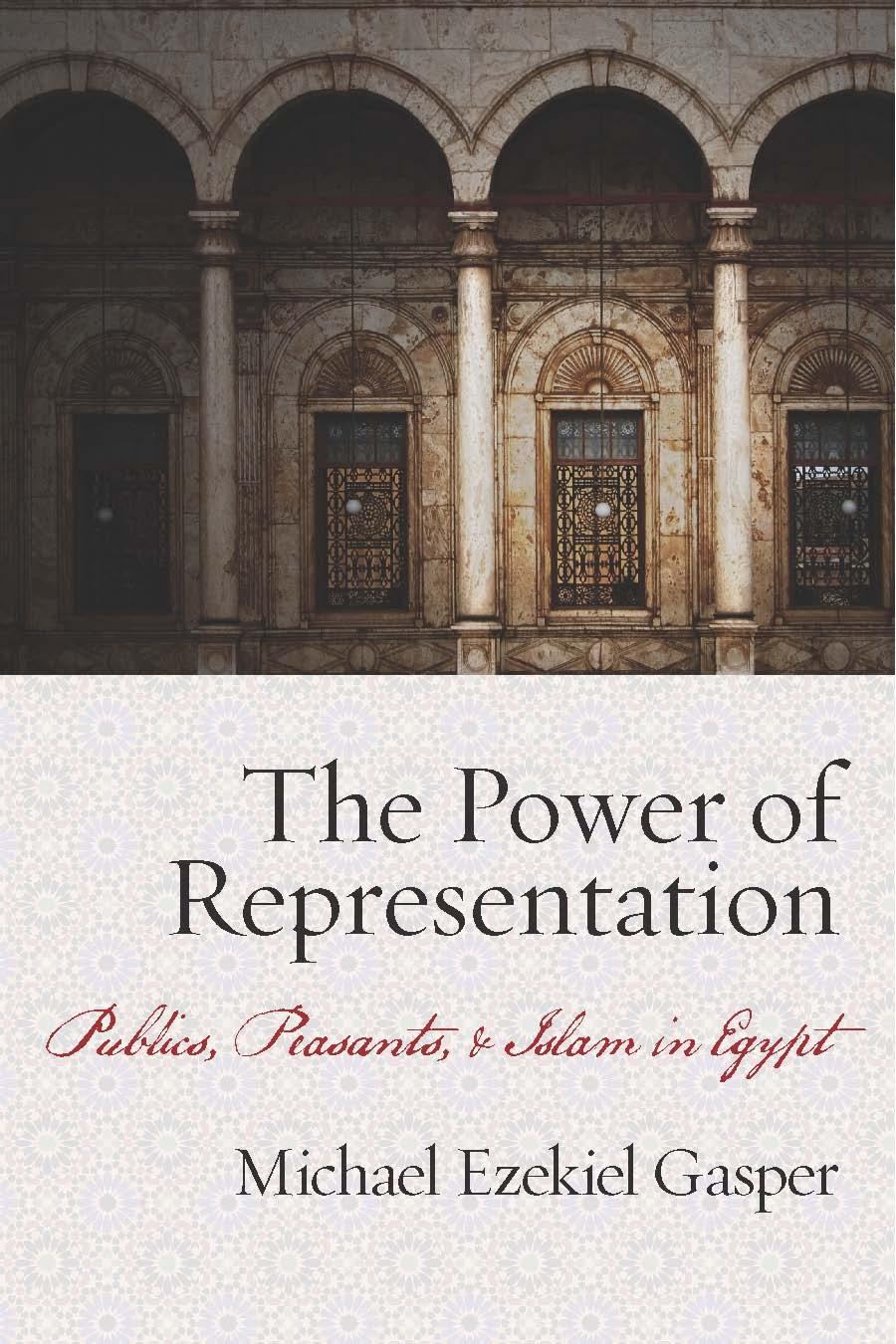
This project was completed only with the assistance of a great number of mentors, teachers, colleagues, and friends. Since this book is based on my doctoral dissertation it is fitting that I begin by thanking my advisor and the rest of my committee. Zachary Lockmans unwavering support and gentle persistence were essential to the completion of the dissertation. His guidance and advice continued through the writing of this book. I am forever grateful. Khalid Fahmy and the rest of my committee, Michael Gilsenen, Bernard Haykel, and Yanni Kotsonis, all contributed in significant ways to the shaping of the dissertation on which this book is based. Of course I take full responsibility for any error or misstatement in this pages.
I have had the good fortune over the years to study with gifted and generous teachers. My debt to them is manifest. They include: Samira Haj, Peter Gran, Sima Fahid, Talal Asad, Timothy Mitchell, Lila Abu-Lughod, Michael Hanagan, Louise Tilly, Aisha Jalal, Rauf Abbas Hamid, and Hasan Hanafi.
I am deeply indebted to the many critics, advice givers, counselors, editors, guides, gurus, mentors, and friends who consistently challenged me in so many beneficial ways and from whom I learned (and continue to learn) so much. Although some of them may not even be aware of their importance to this project, to my education, and to my growth as a person, I want to thank them one and all, zlem Altan, Wael al-Ashari, Sabri Ate, Asl Bali, Banu Bargu, Michael Behrent, Cecile Belavoine, Laura Bier, Eileen Bowman, Koray alikan, Jessica Cooperman, Florence De Lavalette, Samera Esmeir, Tamara Fadl, Ilana Feldman, Nancy Finton, Leila Hamdan, Hanan Hammad, Dyala Hamza, Taja-Nia Henderson, Charles Hirschkind, Najib Hourani, Aisha Ikramuddin, Wilson Jacob, Hamdy El-Jazzar, Arang Keshavarzian, Nermeen al-Khafagi, Saba Mahmood, Khalil Makary, Karuna Mantena, Lisa Pollard, Ramzi Rouighi, Armando Salvatore, Joshua Scherier, Lise Nathan Scherier, Ahmad Shahata, Omnia El Shakry, Nicole Tammelleo, Rabie Wahba, and Muhammad Yousry.
The research and the writing of this book was conducted in Egypt, Lebanon, Italy, and the United States and I would like to express my gratitude for those who made this possible. Yale Universitys Whitney and Betty MacMillan Center for International and Area Studies and its Middle East Council funded several summer research trips to Egypt. The Whitney Humanities Center at Yale University awarded me an A. Whitney Griswold Faculty Research Award to conduct research for this project. I am also grateful to them for awarding me a Frederick W. Hilles Publication Award for the preparation of this manuscript. New York Universitys Institute for the History of the Production of Knowledge was kind enough to award me a Dissertation Fellowship in 20012002 which afforded me the time to read for and write much of my dissertation. The American Research Center in Egypt awarded me a USIA Fellowship in 19981999 to conduct research in Cairo. The United States Department of Education provided funds for Foreign Language and Area Studies awards that I received from New York University. FLAS fellowships funded both a year of study at Cairo University and research related to this project in the Egyptian National Library and National Archives and several other libraries and collections in Cairo and Beirut, Lebanon. I am also grateful to the Center for Arabic Study Abroad at the American University in Cairo for awarding me a fellowship to study Arabic in 19951996.
I would also like to express my deep gratitude to the faculty of the History and Philosophy departments at Cairo University (in particular to Rauf Abbas Hamid and Hasan Hanafi), who welcomed me so warmly into their midst in 1998 and 1999. Finally, I wish to thank the ever helpful and resourceful staffs of the National Library and National Archives in Cairo and the Egyptian National Geographic Society. With near certainty I can say that without their kind words, their encouragement, and most of all their wry sense of humor this project would never have come to fruition.

The social transformations whose manifestation in Egypt is the subject of these chapters are familiar to historians whose work looks at any aspect of colonialism in virtually any place in the world. Colonies around the globe were intended to be or were transformed into commodity producers for European manufacturers. As is well documented in India, Africa, and large swaths of Asia, extractive processes brought with them colonial states and their administrative and bureaucratic infrastructures, which required large cadres of functionaries in order to operate: teachers, translators, accountants, clerks, engineers, and lawyers. Accordingly, the colonial power or powers set up educational institutions or sent some of the locals to the metropole to acquire the skills required to carry out these necessary administrative and technical tasks. In case after case, over time these groups developed a consciousness defined by a bourgeois political outlook replete with nationalist aspirations.
As we have seen throughout these pages, however, a number of factors made Egypts situation distinctive. First, at the beginning of the nineteenth century the regime of Egypts own ruler, the Ottoman-appointed governor Mehmet Ali, was the agent of many of the alterations that were so often imposed through colonialism in other places.
Complicating this situation still further was the fact that Egypt continued to be, at least nominally, a part of the Ottoman Empire until 1914. The Porte was usually quiescent regarding British suzerainty over its so-called province. This faade of legality lent the British occupation an air of legitimacy. Whitehall found this masquerade of Ottoman sovereignty, flimsy as it was, important enough to maintain even at the cost of some freedom of movement for their agent and consul general (the official title of the ranking Briton in Egypt, and the countrys de facto ruler). Ottoman authorization, even if perfunctory, was required for any number of official acts. The Porte officially promulgated all edicts, even those requested by British officials. In addition, until the British declared Husayn Kamil Sultan of Egypt in 1914 in response to the Ottoman Empires entering World War I on the side of the Central Powers, Istanbul officially approved the ascension of each khedive.
Political and administrative details aside, Egypt remained within the orbit of the Ottoman cultural world. Throughout the period there continued to be frequent and fairly easy movement between Cairo and Istanbul. It is true that from the time that Arabic became the official Egyptian language of state in the middle of the nineteenth century there was less emphasis on teaching and learning Turkish; by the second decade of the twentieth century few if any members of the middle-class intelligentsiathe focus of this studywere competent in Turkish. The diminution of Turkish as a bureaucratic language certainly circumscribed the influence of Ottoman Turkish culture among Egypts new professional classes. Nevertheless, in the period between 1870 and 1900, there continued to be cross-fertilization of political thought among Istanbul, Cairo, Aleppo, Beirut and other Ottoman cities. Ottoman constitutionalism, the Young Turk movement, and the pan-Islamic ideas associated with Sultan Abd al-Hamid II were all influential and counted large numbers of followers among Egyptians. In addition, the Ottoman claim to the caliphate, however suspect on historical grounds, continued to carry moral and political weight with many Muslims in Egypt.
Font size:
Interval:
Bookmark:
Similar books «The power of representation publics, peasants, and Islam in Egypt»
Look at similar books to The power of representation publics, peasants, and Islam in Egypt. We have selected literature similar in name and meaning in the hope of providing readers with more options to find new, interesting, not yet read works.
Discussion, reviews of the book The power of representation publics, peasants, and Islam in Egypt and just readers' own opinions. Leave your comments, write what you think about the work, its meaning or the main characters. Specify what exactly you liked and what you didn't like, and why you think so.

